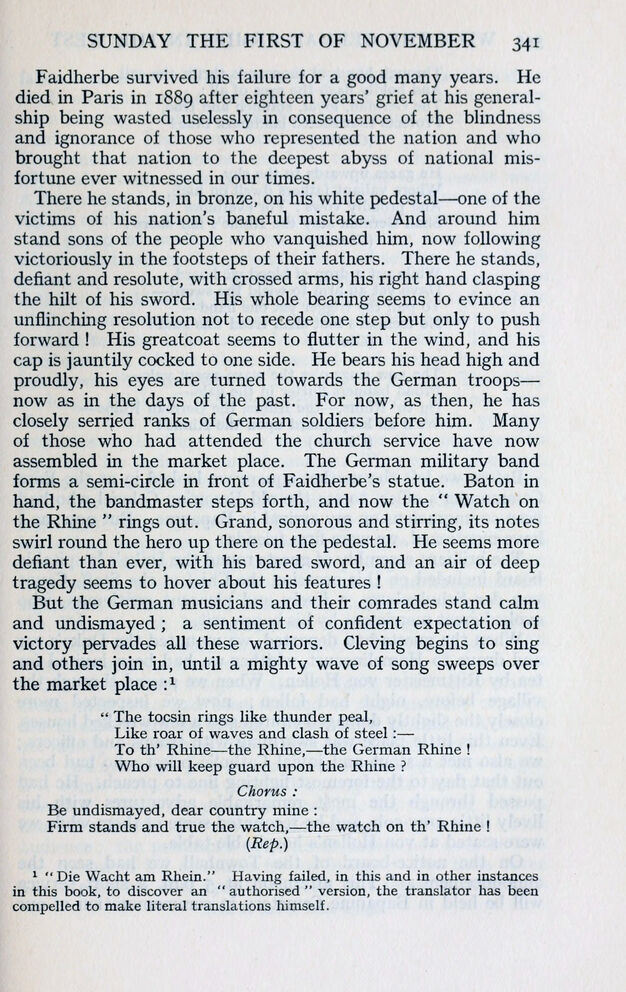
Full resolution (JPEG) - On this page / på denna sida - XXI. Sunday the First of November

<< prev. page << föreg. sida << >> nästa sida >> next page >>
Below is the raw OCR text
from the above scanned image.
Do you see an error? Proofread the page now!
Här nedan syns maskintolkade texten från faksimilbilden ovan.
Ser du något fel? Korrekturläs sidan nu!
This page has never been proofread. / Denna sida har aldrig korrekturlästs.
SUNDAY THE FIRST OF NOVEMBER 341
Faidherbe survived his failure for a good many years. He
died in Paris in 1889 after eighteen years’ grief at his general-
ship being wasted uselessly in consequence of the blindness
and ignorance of those who represented the nation and who
brought that nation to the deepest abyss of national mis-
fortune ever witnessed in our times.
There he stands, in bronze, on his white pedestal—one of the
victims of his nation’s baneful mistake. And around him
stand sons of the people who vanquished him, now following
victoriously in the footsteps of their fathers. There he stands,
defiant and resolute, with crossed arms, his right hand clasping
the hilt of his sword. His whole bearing seems to evince an
unflinching resolution not to recede one step but only to push
forward ! His greatcoat seems to flutter in the wind, and his
cap is jauntily cocked to one side. He bears his head high and
proudly, his eyes are turned towards the German troops
—
now as in the days of the past. For now, as then, he has
closely serried ranks of German soldiers before him. Many
of those who had attended the church service have now
assembled in the market place. The German military band
forms a semi-circle in front of Faidherbe’s statue. Baton in
hand, the bandmaster steps forth, and now the " Watch on
the Rhine " rings out. Grand, sonorous and stirring, its notes
swirl round the hero up there on the pedestal. He seems more
defiant than ever, with his bared sword, and an air of deep
tragedy seems to hover about his features !
But the German musicians and their comrades stand calm
and undismayed ; a sentiment of confident expectation of
victory pervades all these warriors. Cleving begins to sing
and others join in, until a mighty wave of song sweeps over
the market place :^
" The tocsin rings like thunder peal,
Like roar of waves and clash of steel :
—
To th’ Rhine—the Rhine,—the German Rhine !
Who will keep guard upon the Rhine ?
Chorus :
Be undismayed, dear country mine :
Firm stands and true the watch.—the watch on th’ Rhine !
{Rep.)
^ " Die Wacht am Rhein." Having failed, in this and in other instances
in this book, to discover an " authorised " version, the translator has been
compelled to make literal translations himself.
<< prev. page << föreg. sida << >> nästa sida >> next page >>